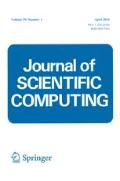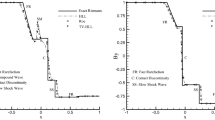Abstract
Magnetohydrodynamics (MHD) is the study of the interaction of electrically conducting fluids in the presence of magnetic fields. MHD applications require substantially more efficient numerical methods than currently exist. In this paper, we construct two decoupled methods based on the artificial compression method (uncoupling the pressure and velocity) and partitioned method (uncoupling the velocity and electric potential) for magnetohydrodynamics flows at low magnetic Reynolds numbers. The methods we study allow us at each time step to solve linear problems, uncoupled by physical processes, per time step, which can greatly improve the computational efficiency. This paper gives the stability and error analysis, presents a brief analysis of the non-physical acoustic waves generated, and provides computational tests to support the theory.
Access this article
We’re sorry, something doesn't seem to be working properly.
Please try refreshing the page. If that doesn't work, please contact support so we can address the problem.







Similar content being viewed by others
References
Alfvén, H.: Existence of electromagnetic-hydrodynamic waves. Nature. 150, 405–406 (1942)
Moffatt, H.K.: Field generation in electrically conducting fluids[M]. Cambridge University Press, (1978)
Barleon, L., Casal, V., Lenhart, L.: MHD flow in liquid-metal-cooled blankets. Fusion Engineering and Design. 14, 401–412 (1991)
Davidson, P.A.: Magnetohydrodynamics in material processing. Annu. Rev. Fluid Mech. 31, 273–300 (1999)
Lin, T.F., Gilbert, J.B., Kossowsky, R.: Sea-water magnetohydrodynamic propulsion for next-generation undersea vehicles. PENNSYLVANIA STATE UNIV STATE COLLEGE APPLIED RESEARCH LAB (1990)
Gerbeau, J.F., Bris, C.L., Lelièvre, T.: Mathmatical methods for the Magnetohydrodynamics of Liquid metals. Oxford University Press, (2006)
Adams, R.A.: Sobolev spaces. Academic press, (2003)
Ascher, U.M., Ruuth, S.J., Wetton, B.T.R.: Implicit-explicit methods for time-dependent partial differential equations[J]. SIAM Journal on Numerical Analysis. 32(3), 797–823 (1995)
Chorin, A.J.: Numerical solution of the Navier-Stokes equations[J]. Mathematics of computation. 22(104), 745–762 (1968)
Rannacher, R.: On Chorin’s projection method for the incompressible Navier-Stokes equations, pp. 167–183. In The Navier-Stokes equations IItheory and numerical methods. Springer, Berlin Heidelberg (1992)
Turek, S.: A comparative study of some time-stepping techniques for the incompressible Navier-Stokes equations: From fully implicit nonlinear schemes to semi-implicit projection methods[M]. IWR. (1995)
Peterson, J.S.: On the finite element approximation of incompressible flows of an electrically conducting fluid[J]. Numerical Methods for Partial Differential Equations. 4(1), 57–68 (1988)
Su, H., Feng, X., Huang, P.: Iterative methods in penalty finite element discretization for the steady MHD equations[J]. Computer Methods in Applied Mechanics and Engineering 304, 521–545 (2016)
Zhang, Q., Su, H., Feng, X.: A partitioned finite element scheme based on Gauge-Uzawa method for time-dependent MHD equations[J]. Numerical Algorithms, : 1-19 (2017)
Zhu, T., Su, H., Feng, X.: Some Uzawa-type finite element iterative methods for the steady incompressible magnetohydrodynamic equations[J]. Applied Mathematics and Computation 302, 34–47 (2017)
Wu, J., Liu, D., Feng, X., Huang, P.: An efficient two-step algorithm for the stationary incompressible magnetohydrodynamic equations[J]. Applied Mathematics and Computation 302, 21–33 (2017)
Su, H., Feng, X., Zhao, J.: Two-Level Penalty Newton Iterative Method for the 2D/3D Stationary Incompressible Magnetohydrodynamics Equations[J]. Journal of Scientific Computing 70(3), 1144–1179 (2017)
Dong, X., He, Y., Zhang, Y.: Convergence analysis of three finite element iterative methods for the 2D/3D stationary incompressible magnetohydrodynamics, Comput. Methods Appl. Mech. Engrg. 276 287C311 (2014)
Dong, X., He, Y.: Two-level Newton iterative method for the 2D/3D stationary incompressible magnetohydrodynamics. J. Sci. Comput. 63, 426C451 (2015)
Yuksel, G., Ingram, R.: Numerical analysis of a finite element Crank-Nicolson discretization for MHD flows at small magnetic Reynolds numbers. International Journal of Numerical Analysis and Modeling. 10(1), 74–98 (2013)
Roberts, P.H.: An introduction to magnetohydrodynamics. Elsevier, USA (1967)
Davidson, P.A.: An Introduction to Magnetohydrodynamics. Cambridge University Press, United Kingdom (2001)
Layton, W.J., Tran, H., Trenchea, C.: Numerical analysis of two partitioned methods for uncoupling evolutionary MHD flows. Numer. Meth. Part D. E. 30(4), 1083–1102 (2014)
Layton W, Tran H, Trenchea C. Stability of partitioned methods for magnetohydrodynamics flows at small magnetic Reynolds number[J]. Recent advances in scientific computing and applications. 586(231) (2013)
Yuksel, G., Isik, O.R.: Numerical analysis of Backward-Euler discretization for simplified magnetohydynamic flows. Applied Mathematical Modelling. 39, 1889–1898 (2015)
Lighthill, M.J.: On sound generated aerodynamically. I. General theory[C]. Proceedings of the Royal Society of London A: Mathematical, Physical and Engineering Sciences. The Royal Society, 211(1107): 564-587 (1952)
Layton, W., Novotny, A.: The exact derivation of the Lighthill acoustic analogy for low Mach number flows. Advances in Math Fluid Mech. 247-279 (2009)
Shen, J.: On error estimates of the penalty method for unsteady Navier-Stokes equations[J]. SIAM Journal on Numerical Analysis. 32(2), 386–403 (1995)
Fabrie, P., Galusinski, C.: The slightly compressible Navier-Stokes equations revisited[J]. Nonlinear Analysis: Theory, Methods and Applications. 46(8), 1165–1195 (2001)
Shen, J.: On a new pseudocompressibility method for the incompressible Navier-Stokes equations[J]. Applied numerical mathematics. 21(1), 71–90 (1996)
Zhang, G., He, Y.: Decoupled schemes for unsteady MHD equations. I. time discretization, Numer. Method Part. Diff. Equ. 33(3), 956C973 (2017)
Zhang, G., He, Y.: Decoupled schemes for unsteady MHD equations II: Finite element spatial discretization and numerical implementation. Comput. Math. Appl. 69, 1390C1406 (2015)
He, Y.: Unconditional convergence of the Euler semi-implicit scheme for the three-dimensional incompressible MHD equations. IMA Journal of Numerical Analysis. dru015, (2014)
Shen, J.: Pseudo-compressibility methods for the unsteady incompressible Navier-Stokes equations. In Proceedings of the 1994 Beijing symposium on nonlinear evolution equations and infinite dynamical systems. 68-78 (1997)
Rong, Y., Hou, Y., Zhang, Y.: Numerical analysis of a second order algorithm for simplified magnetohydrodynamic flows[J]. Advances in Computational Mathematics. 43, 823–848 (2017)
Rong, Y., Hou, Y.: A Partitioned Second-Order Method for Magnetohydrodynamic Flows at Small Magnetic Reynolds Numbers. Numerical Methods for Partial Differential Equations. 33(6), 1966–1986 (2017)
Shen, J.: On error estimates of projection methods for Navier-Stokes equations: first-order schemes[J]. SIAM Journal on Numerical Analysis. 29(1), 57–77 (1992)
Shen, J.: On error estimates of some higher order projection and penalty-projection methods for Navier-Stokes equations[J]. Numerische Mathematik. 62(1), 49–73 (1992)
Prohl, A.: Convergent finite element discretizations of the nonstationary incompressible magnetohydrodynamics system[J]. ESAIM. Mathematical Modelling and Numerical Analysis 42(6), 1065–1087 (2008)
Temam, R.: Sur l’approximation de la solution des quations de Navier-Stokes par la mthode des pas fractionnaires (I)[J]. Archive for Rational Mechanics and Analysis. 32(2), 135–153 (1969)
Hecht, F., Pironneau, O.: FreeFem++. Webpage: http://www.freefem.org
Author information
Authors and Affiliations
Corresponding author
Additional information
Yao Rong was supported by NSFC (Grants 11171269 and 11571274) and China Scholarship Council (Grant 201606280154). William Layton and Haiyun Zhao supported by NSF Grants DMS 1522267 and CBET 160910.
Rights and permissions
About this article
Cite this article
Rong, Y., Layton, W. & Zhao, H. Numerical Analysis of an Artificial Compression Method for Magnetohydrodynamic Flows at Low Magnetic Reynolds Numbers. J Sci Comput 76, 1458–1483 (2018). https://doi.org/10.1007/s10915-018-0670-5
Received:
Revised:
Accepted:
Published:
Issue Date:
DOI: https://doi.org/10.1007/s10915-018-0670-5



